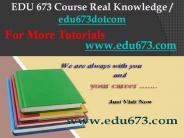Edu 673 Week 5 Differentiating For Learning PowerPoint PPT Presentations
All Time
Recommended
Check this A+ tutorial guideline at http://www.assignmentcloud.com/EDU-673-ASH/EDU-673-Week-5-Differentiating-for-Learning-Profile For this assignment you will need a lesson plan or unit that includes measurable learning outcomes. You may continue to use the lesson plan from previous weeks, create a new one, or modify one that you have found.
| PowerPoint PPT presentation | free to download
For more course tutorials visit www.edu673.com EDU 673 Week 1 Brain Research Supports Differentiation EDU 673 Week 1 DQ 1 Key Principles of Effective Differentiation EDU 673 Week 1 DQ 2 Educational Neuroscience EDU 673 Week 2 DQ 1 Fluid and Fixed Mindsets EDU 673 Week 2 DQ 2 Effective Differentiated Curriculum EDU 673 Week 2 Journal EDU 673 Week 2 Welcome Activity
| PowerPoint PPT presentation | free to download
For this assignment you will need a lesson plan or unit that includes an assessment. You may use one of your own, create a new one, or modify one that you find. Make sure the assessment contains all the elements of effective assessment and then explain or provide measures to show: a. How it aligns to the essential knowledge, understanding, and skills of the targeted learning outcomes.
| PowerPoint PPT presentation | free to download
For this assignment you will need a lesson plan or unit that includes measurable learning outcomes. You may continue to use the lesson plan from Week Three, or you can create a new one or modify one that you have found. Provide and explain differentiated teaching strategies that are appropriate for a variety of students at different levels of readiness. Your strategies must align to the learning outcomes.
| PowerPoint PPT presentation | free to download
Check this A+ tutorial guideline at http://www.assignmentcloud.com/EDU-673-ASH/EDU-673-Week-1-Brain-Research-Supports-Differentiation In a three- to five-page paper (not including title and reference pages): a. Analyze how neuroscientific research findings and recent discoveries regarding how the brain learns support differentiation in the classroom. b. Discuss how insights into the learning process affirm the importance of differentiation.
| PowerPoint PPT presentation | free to download
Check this A+ tutorial guideline at http://www.assignmentcloud.com/EDU-673-ASH/EDU-673-Week-2-DQ-2-Effective-Differentiated-Curriculum Visit the Discovery Education: Lesson Plan Library website and locate a lesson plan that represents the grade level and subject area you are teaching or are interested in teaching.
| PowerPoint PPT presentation | free to download
Check this A+ tutorial guideline at http://www.assignmentcloud.com/EDU-673-ASH/EDU-673-Week-6-DQ-1-Orderly-Flexible-Learning-Environments Our text describes four kinds of classroom environments that stem from teacher management beliefs and styles. Orderly-flexible learning environments are most likely to support differentiated instruction. Choose one of the following three kinds of classroom environments: o Dysfunctional learning environments o Adequate learning environments
| PowerPoint PPT presentation | free to download
EDU 673 course is a grassroots open education project with a model for lifelong learning.
| PowerPoint PPT presentation | free to download
EDU 673 Entire Course (Ash) For more course tutorials visit www.edu673.com EDU 673 Week 1 Brain Research Supports Differentiation EDU 673 Week 1 DQ 1 Key Principles of Effective Differentiation EDU 673 Week 1 DQ 2 Educational Neuroscience
| PowerPoint PPT presentation | free to download
For more course tutorials visit www.tutorialrank.com EDU 673 Week 1 Brain Research Supports Differentiation EDU 673 Week 1 DQ 1 Key Principles of Effective Differentiation EDU 673 Week 1 DQ 2 Educational Neuroscience EDU 673 Week 2 DQ 1 Fluid and Fixed Mindsets EDU 673 Week 2 DQ 2 Effective Differentiated Curriculum EDU 673 Week 2 Journal EDU 673 Week 2 Welcome Activity EDU 673 Week 3 Assessment and Differentiation EDU 673 Week 3 DQ 1 Effective Assessment EDU 673 Week 3 DQ 2 Summative Assessment EDU 673 Week 3 Journal EDU 673 Week 4 Differentiated Instruction for Student Readiness EDU 673 Week 4 DQ 1 Student Readiness EDU 673 Week 4 DQ 2 Student Interest EDU 673 Week 5 Differentiating for Learning Profile EDU 673 Week 5 DQ 1 Learning Style Debate EDU 673 Week 5 DQ 2 Culture and Gender EDU 673 Week 5 Journal
| PowerPoint PPT presentation | free to download
Imagine it is the first day of school and you are welcoming a whole new set of students to class. Create your own welcoming activity for the first day of school that demonstrates how you will incorporate differentiation through a growth mindset. You are not limited to any particular format, but you must address the following: a. How you will provide a safe and secure classroom climate b. How you will provide a positive learning environment
| PowerPoint PPT presentation | free to download
Educational neuroscience is an exciting new discipline that brings together research from psychology, neuroscience and pedagogy to help educators make the best curriculum, instructional and assessment choices for effective learning. Locate an article in the Ashford Online Library that investigates findings from cognitive and neuroscientific research. Provide a brief summary of the article and explain how the findings could be translated into what educators do in schools and classrooms. Do the findings support differentiated teaching and learning? Why or why not?
| PowerPoint PPT presentation | free to download
After watching the talks by Sir Ken Robinson (TED Talk – Ken Robinson Says Schools Kill Creativity, and TED Talk – Sir Ken Robinson: Bring on the Learning Revolution!), answer the following questions: o Does differentiation make the difference between a good teacher and a great teacher? Why or why not?
| PowerPoint PPT presentation | free to download
To create your Final Project you will be designing your own Professional Development Plan. You will need to create a step-by-step timeline that shows your commitment to personal and professional growth in creating academically and culturally diverse classrooms.
| PowerPoint PPT presentation | free to download
For more course tutorials visit www.edu673.com EDU 673 Week 1 Brain Research Supports Differentiation EDU 673 Week 1 DQ 1 Key Principles of Effective Differentiation EDU 673 Week 1 DQ 2 Educational Neuroscience EDU 673 Week 2 DQ 1 Fluid and Fixed Mindsets EDU 673 Week 2 DQ 2 Effective Differentiated Curriculum EDU 673 Week 2 Journal EDU 673 Week 2 Welcome Activity EDU 673 Week 3 Assessment and Differentiation
| PowerPoint PPT presentation | free to download
For more classes visit www.snaptutorial.com EDU 673 Week 1 Brain Research Supports Differentiation EDU 673 Week 1 DQ 1 Key Principles of Effective Differentiation
| PowerPoint PPT presentation | free to download
For more course tutorials visit www.uophelp.com EDU 673 Week 1 Brain Research Supports Differentiation EDU 673 Week 1 DQ 1 Key Principles of Effective Differentiation EDU 673 Week 1 DQ 2 Educational Neuroscience EDU 673 Week 2 DQ 1 Fluid and Fixed Mindsets EDU 673 Week 2 DQ 2 Effective Differentiated Curriculum EDU 673 Week 2 Journal EDU 673 Week 2 Welcome Activity EDU 673 Week 3 Assessment and Differentiation EDU 673 Week 3 DQ 1 Effective Assessment EDU 673 Week 3 DQ 2 Summative Assessment EDU 673 Week 3 Journal
| PowerPoint PPT presentation | free to download
"For more classes visit www.snaptutorial.com EDU 673 Week 1 Brain Research Supports Differentiation EDU 673 Week 1 DQ 1 Key Principles of Effective Differentiation EDU 673 Week 1 DQ 2 Educational Neuroscience EDU 673 Week 2 DQ 1 Fluid and Fixed Mindsets EDU 673 Week 2 DQ 2 Effective Differentiated Curriculum EDU 673 Week 2 Journal EDU 673 Week 2 Welcome Activity "
| PowerPoint PPT presentation | free to download
For more course tutorials visit www.edu673.com EDU 673 Week 1 Brain Research Supports Differentiation EDU 673 Week 1 DQ 1 Key Principles of Effective Differentiation EDU 673 Week 1 DQ 2 Educational Neuroscience EDU 673 Week 2 DQ 1 Fluid and Fixed Mindsets EDU 673 Week 2 DQ 2 Effective Differentiated Curriculum EDU 673 Week 2 Journal EDU 673 Week 2 Welcome Activity EDU 673 Week 3 Assessment and Differentiation
| PowerPoint PPT presentation | free to download
For more classes visit www.snaptutorial.com EDU 673 Week 1 Brain Research Supports Differentiation EDU 673 Week 1 DQ 1 Key Principles of Effective Differentiation EDU 673 Week 1 DQ 2 Educational Neuroscience EDU 673 Week 2 DQ 1 Fluid and Fixed Mindsets EDU 673 Week 2 DQ 2 Effective Differentiated Curriculum EDU 673 Week 2 Journal EDU 673 Week 2 Welcome Activity EDU 673 Week 3 Assessment and Differentiation EDU 673 Week 3 DQ 1 Effective Assessment EDU 673 Week 3 DQ 2 Summative Assessment
| PowerPoint PPT presentation | free to download
For more classes visit www.snaptutorial.com EDU 673 Week 1 Brain Research Supports Differentiation EDU 673 Week 1 DQ 1 Key Principles of Effective Differentiation EDU 673 Week 1 DQ 2 Educational Neuroscience EDU 673 Week 2 DQ 1 Fluid and Fixed Mindsets EDU 673 Week 2 DQ 2 Effective Differentiated Curriculum EDU 673 Week 2 Journal EDU 673 Week 2 Welcome Activity EDU 673 Week 3 Assessment and Differentiation EDU 673 Week 3 DQ 1 Effective Assessment EDU 673 Week 3 DQ 2 Summative Assessment EDU 673 Week 3 Journal EDU 673 Week 4 Differentiated Instruction for Student Readiness
| PowerPoint PPT presentation | free to download
For more course tutorials visit www.edu673.com EDU 673 Week 1 Brain Research Supports Differentiation EDU 673 Week 1 DQ 1 Key Principles of Effective Differentiation EDU 673 Week 1 DQ 2 Educational Neuroscience EDU 673 Week 2 DQ 1 Fluid and Fixed Mindsets EDU 673 Week 2 DQ 2 Effective Differentiated Curriculum EDU 673 Week 2 Journal EDU 673 Week 2 Welcome Activity
| PowerPoint PPT presentation | free to download
For more course tutorials visit www.edu673.com EDU 673 Week 1 Brain Research Supports Differentiation EDU 673 Week 1 DQ 1 Key Principles of Effective Differentiation EDU 673 Week 1 DQ 2 Educational Neuroscience EDU 673 Week 2 DQ 1 Fluid and Fixed Mindsets EDU 673 Week 2 DQ 2 Effective Differentiated Curriculum
| PowerPoint PPT presentation | free to download
For more course tutorials visit www.uophelp.com EDU 673 Week 1 Brain Research Supports Differentiation EDU 673 Week 1 DQ 1 Key Principles of Effective Differentiation EDU 673 Week 1 DQ 2 Educational Neuroscience EDU 673 Week 2 DQ 1 Fluid and Fixed Mindsets EDU 673 Week 2 DQ 2 Effective Differentiated Curriculum EDU 673 Week 2 Journal EDU 673 Week 2 Welcome Activity EDU 673 Week 3 Assessment and Differentiation EDU 673 Week 3 DQ 1 Effective Assessment EDU 673 Week 3 DQ 2 Summative Assessment EDU 673 Week 3 Journal
| PowerPoint PPT presentation | free to download
For more course tutorials visit www.uophelp.com EDU 673 Week 1 Brain Research Supports Differentiation EDU 673 Week 1 DQ 1 Key Principles of Effective Differentiation EDU 673 Week 1 DQ 2 Educational Neuroscience EDU 673 Week 2 DQ 1 Fluid and Fixed Mindsets EDU 673 Week 2 DQ 2 Effective Differentiated Curriculum EDU 673 Week 2 Journal EDU 673 Week 2 Welcome Activity EDU 673 Week 3 Assessment and Differentiation EDU 673 Week 3 DQ 1 Effective Assessment EDU 673 Week 3 DQ 2 Summative Assessment EDU 673 Week 3 Journal
| PowerPoint PPT presentation | free to download
EDU 673 course is a grassroots open education project with a model for lifelong learning.
| PowerPoint PPT presentation | free to download
EDU 673 course is a grassroots open education project with a model for lifelong learning.
| PowerPoint PPT presentation | free to download
For more course tutorials visit www.uophelp.com EDU 673 Week 1 Brain Research Supports Differentiation EDU 673 Week 1 DQ 1 Key Principles of Effective Differentiation EDU 673 Week 1 DQ 2 Educational Neuroscience EDU 673 Week 2 DQ 1 Fluid and Fixed Mindsets EDU 673 Week 2 DQ 2 Effective Differentiated Curriculum EDU 673 Week 2 Journal EDU 673 Week 2 Welcome Activity
| PowerPoint PPT presentation | free to download
EDU 673 Week 1 Brain Research Supports Differentiation EDU 673 Week 1 DQ 1 Key Principles of Effective Differentiation EDU 673 Week 1 DQ 2 Educational Neuroscience EDU 673 Week 2 DQ 1 Fluid and Fixed Mindsets EDU 673 Week 2 DQ 2 Effective Differentiated Curriculum EDU 673 Week 2 Journal EDU 673 Week 2 Welcome Activity EDU 673 Week 3 Assessment and Differentiation EDU 673 Week 3 DQ 1 Effective Assessment
| PowerPoint PPT presentation | free to download
Check this A+ tutorial guideline at http://www.assignmentcloud.com/EDU-673-ASH/EDU-673-Complete-Class-Guide EDU 673 Week 1 Brain Research Supports Differentiation EDU 673 Week 1 DQ 1 Key Principles of Effective Differentiation EDU 673 Week 1 DQ 2 Educational Neuroscience EDU 673 Week 2 DQ 1 Fluid and Fixed Mindsets
| PowerPoint PPT presentation | free to download
Instructional Development (EDER675) February10, Learners
| PowerPoint PPT presentation | free to download
Addressing Student Social and Emotional Needs. A Renaissance Schools Fund Workshop ... Three instruments: elementary, middle and high school versions ...
| PowerPoint PPT presentation | free to view
Nucleation and growth (thermodynamics, kinetics): the rate at which reaction takes place ... What thermodynamic quantity should we use to predict whether or not ...
| PowerPoint PPT presentation | free to view
F o u n d e d 1 8 7 0 R o l l a , M i s s o u r i
| PowerPoint PPT presentation | free to view
What do successful families have in common? ... Richards, M. H., Miller, B. V., O'Donnell, P. C., Wasserman, M. S., & Colder, C. (2004) ...
| PowerPoint PPT presentation | free to view
F o u n d e d 1 8 7 0 R o l l a , M i s s o u r i
| PowerPoint PPT presentation | free to view
Abortion was legalized in 1973 ... More at http://www.catholic.com/library/Abortion.asp ... he considered abortion of the fetus in the earlier stages of either the ...
| PowerPoint PPT presentation | free to download
EDU 673 Week 5 Differentiating for Learning Profile






































